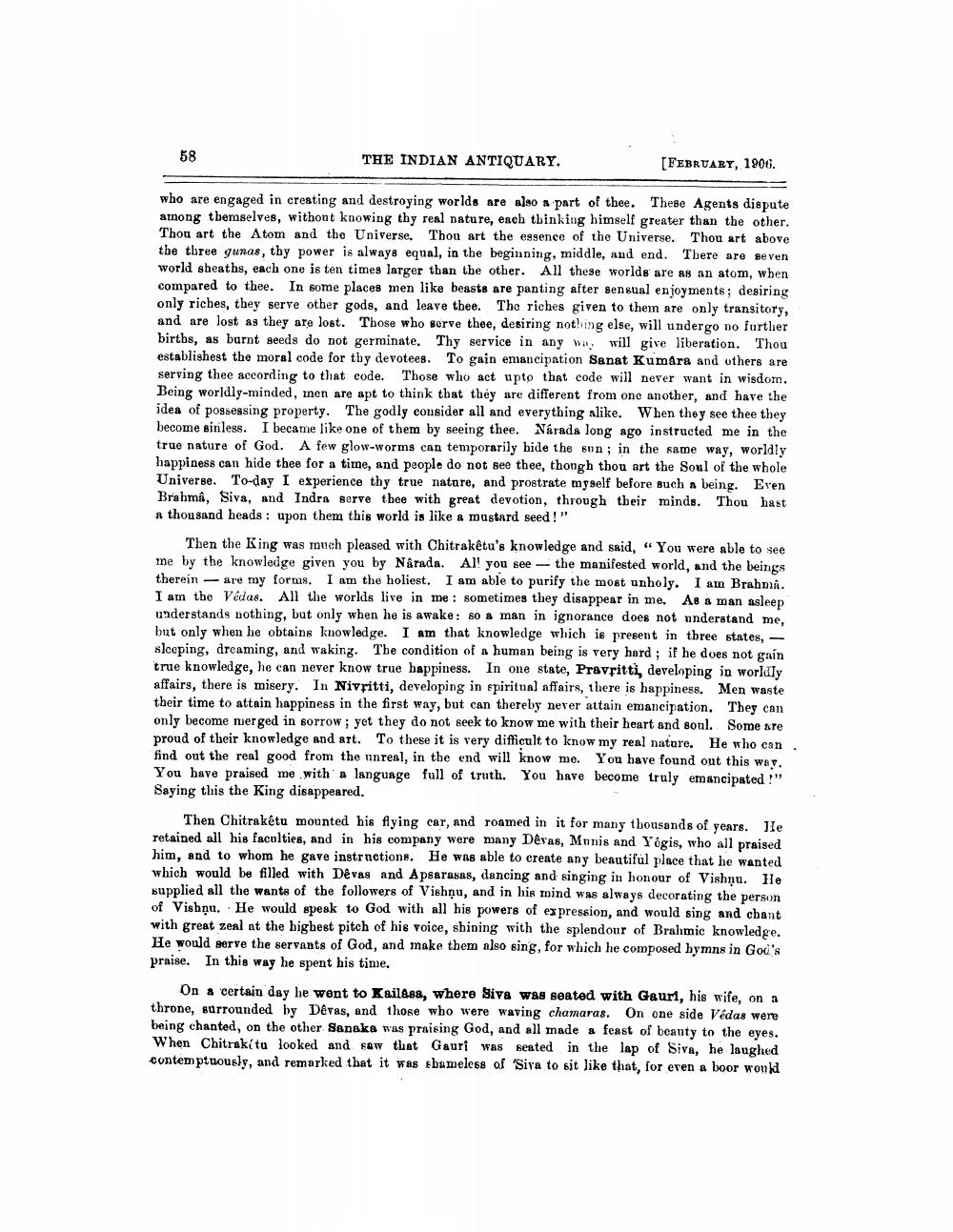________________
58
THE INDIAN ANTIQUARY.
[FEBRUARY, 1906.
who are engaged in creating and destroying worlds are also a part of thee. These Agents dispute among themselves, without knowing thy real nature, each thinking himself greater than the other. Thou art the Atom and the Universe. Thou art the essence of the Universe. Thou art above the three gunas, thy power is always equal, in the beginning, middle, and end. There are seven world sheaths, each one is ten times larger than the other. All these worlds are as an atom, when compared to thee. In some places men like beasts are panting after sensual enjoyments; desiring only riches, they serve other gods, and leave thee. The riches given to them are only transitory, and are lost as they are lost. Those who serve thee, desiring nothing else, will undergo no further births, as burnt seeds do not germinate. Thy service in any way will give liberation. Thou establishest the moral code for thy devotees. To gain emancipation Sanat Kumara and others are serving thee according to that code. Those who act upto that code will never want in wisdom. Being worldly-minded, inen are apt to think that they are different from one another, and have the idea of possessing property. The godly consider all and everything alike. When they see thee they become siriless. I became like one of them by seeing thee. Nárada long ago instructed me in the true nature of God. A few glow-worms can temporarily hide the sun; in the same way, worldly happiness can hide thee for a time, and people do not see thee, though thou art the Soul of the whole Universe. To-day I experience thy true nature, and prostrate myself before such a being. Even Brahmâ, Siva, and Indra serve thee with great devotion, through their minds. Thou hast * thousand heads : upon them this world is like a mustard seed!"
Then the King was much pleased with Chitrakêtu's knowledge and said, “You were able to see me by the knowledge given you by Nárada. All you see the manifested world, and the beings therein – are my forms. I am the holiest. I am able to purify the most unholy. I am Brahma. I am the Vedas. All the worlds live in me: sometimes they disappear in me. As a man asleep understands nothing, but only when he is awake: so a man in ignorance does not understand me, but only when he obtains knowledge. I am that knowledge which is present in three states, - sleeping, dreaming, and waking. The condition of a human being is very hard ; if he does not gain true knowledge, he can never know true happiness. In one state, Pravritti, developing in worldly affairs, there is misery. In Nivfitti, developing in spiritual affairs, there is happiness. Men waste their time to attain happiness in the first way, but can thereby never attain emancipation. They can only become merged in sorrow; yet they do not seek to know me with their heart and soul. Some are proud of their knowledge and art. To these it is very difficult to know my real nature. He who can. find out the real good from the unreal, in the end will know me. You have found out this way. You have praised me with a language full of truth. You have become truly emancipated!” Saying this the King disappeared.
Then Chitraketu mounted his flying car, and roamed in it for many thousands of years. He retained all his faculties, and in his company were many Dêras, Munis and Yogis, who all praised him, and to whom he gave instructions. He was able to create any beautiful place that he wanted which would be filled with Devas and Apsarasas, dancing and singing in honour of Vishnu. He supplied all the wants of the followers of Vishņu, and in his mind was always decorating the person of Vishņu. He would speak to God with all his powers of expression, and would sing and chant with great zeal at the highest pitch of his voice, shining with the splendour of Brahmic knowledge. He would serve the servants of God, and make them also sing, for which he composed hymns in God's praise. In this way he spent his time.
On a certain day he wont to Kailasa, where Siva was seated with Gauri, his wife, on a throne, surrounded by Devas, and those who were waving chamaras. On one side Vedas were being chanted, on the other Sanaka was praising God, and all made a feast of beauty to the eyes. When Chitrakitu looked and saw that Gauri was seated in the lap of Siva, he laughed contemptuously, and remarked that it was ebameless of Siya to sit like that, for even a boor would




